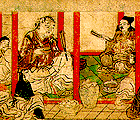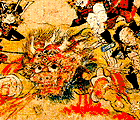|
Eiya! Eiya! They crossed their swords. Long ago, in the Heian period, a series of horrible incidents occurred in the capital. Money and treasures were stolen nightly, and countless beautiful girls were being kidnapped. According to Abe no Seimei, the greatest fortuneteller of the time, these were the doings of a group of Oni lead by Shutendoji ("the sake-drinking kid") who resided in Mt. Oh-e of Tanba country. Ordered by the emperor to subdue the villainous Oni, Minamoto no Yorimitsu, together with Fujiwara no Yasumasa, Watanabe no Tsuna, and Sakata no Kintoki, set off for the mountain disguised as mountain ascetics.
Along the way, the four warriors met three old men living in a cave. These old men turned out to be guardian spirits. They gave the warriors a mystical potion which was said to be a sake that is beneficial for gods but poisonous for Oni. "If the Oni drink this sake, they will lose all of their magical powers and become as helpless as infants. Now, if you men were to drink this, you would be imbued with divine powers." Pretending to have gotten lost, Yorimitsu and his men entered the oni's abode and served them the sake that they had brought. This pleased Shutendoji greatly. "Make yourselves at home. Please drink up! Drink up!" he said, as he gradually let down his guard, "There is nothing I like more than drinking sake. People call me Shutendoji, the sake-drinking kid." He laughed jauntily. In a little while, all the oni had drunk themselves to sleep.
Yorimitsu and his men took this opportunity to brace themselves with armor and then succeeded in slaying all of the Oni, including Shutendoji, Ibaragidoji (Thorn-castle kid,) Hoshikumadoji (Star-bear kid,) Torakumadoji (Tiger-bear kid,) and Kanakumadoji (Golden-bear kid.)
This world, it's my world, Below the flourishing surface of the Heian Empire, out of which came such bold poems as the above, were the countless figures of people (Oni) forced to live in the dark shadows of society.
Shutendoji, as written in the Otogizoshi (a collection of folk tales recorded in the Heian period,) was a child taken into Enryaku-ji temple of Mt. Hiei in Kyoto. At that time in Hiei, it was the temple's custom to keep children's hair long until they were formally accepted as Buddhist monks, at which time their heads were shaven. Many of these homeless delinquents chose to form bands and dwell in mountain caves, most likely to share their losses and gains and to secure their own safety. Their feelings about the circumstances of their lives can be seen in the fact that they willingly chose to keep their childhood names as apprentice monks. The oni of Mt. Oh-e are the thieving and murderous bandits of the mountain who terrorized the capital and yet kept their childhood names throughout their lives. In commemoration of these tragic outcasts of society, the ancient story-tellers made them into legendary heroes - Oni - surpassing their victors in fame and character. It is as though the story-tellers sympathized with these rebels of an authoritarian society. One of the Yorimitsu's men, Sakata no Kintoki is the famous Kintaro of Japanese folk tales. It is ironic that Kintaro was also a mountain orphan -- in other words, an Oni.
|

